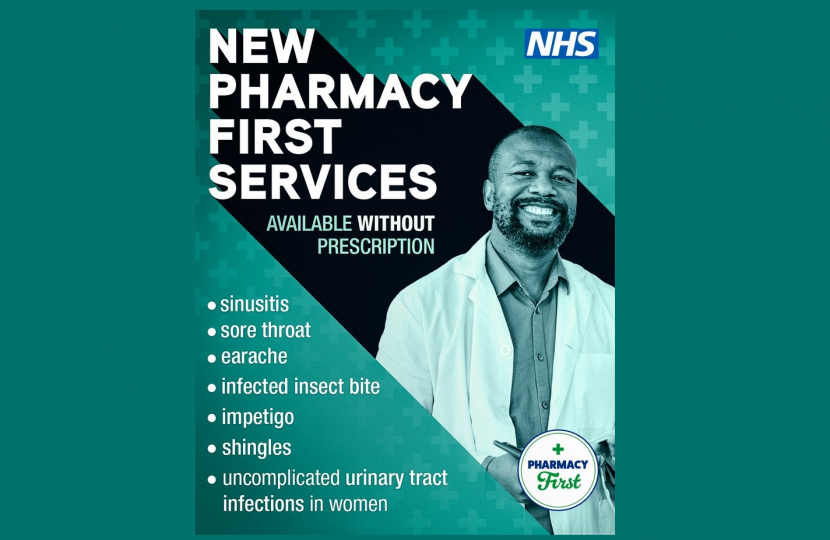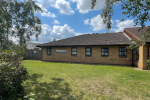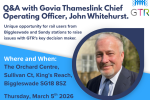
Richard has welcomed the launch of the government’s Pharmacy First approach, helping patients across North East Bedfordshire to receive care more quickly through better use of our community pharmacies.
147 pharmacies in the Bedfordshire, Luton and Milton Keynes Integrated Care Board (ICB) Area have signed up to Pharmacy First so far, which enables pharmacists to utilise more of their medical skills and training. This will mean that patients can receive treatment for seven common health conditions from their local pharmacy without the need to visit a GP or have a prescription.
The pharmacist will be able to help with conditions that include sinusitis, sore throat, earache, infected insect bite, impetigo, shingles, and uncomplicated urinary tract infections in women. Following the assessment, the pharmacist can then supply the prescription-only medicines, including antibiotics and antivirals, to treat the problem.
The new Pharmacy First approach will not only speed up access to essential care for patients, but also help to reduce pressure on local GP services by directing people to more appropriate places to be treated. Backed by up to £645 million, 95 per cent of pharmacies across England have opted-in so far, meaning that patients will be able to receive care more quickly without the need to wait for a GP appointment.
The Pharmacy First approach builds on the other measures outlined in the Primary Care Recovery Plan last spring, including tackling the 8am rush by giving GPs new digital tools and providing more GP staff and more appointments.
In combination, the Primary Care Recovery Plan aims to free up 10 million GP appointments a year by next winter, and give the public more choice in where and how they access care.
The government has made strong progress on improving access to primary care including meeting its manifesto pledge to deliver 50 million additional GP appointments since 2019 and recruiting record numbers of doctors and nurses for the NHS. By sticking to the plan, the Government is delivering on the Prime Minister’s pledge to cut NHS waiting lists, delivering more care in the community and ensuring that patients receive the care they need, when they need it.
Commenting, Richard Fuller MP said:
I am pleased that the government has launched the Pharmacy First approach, using the skills of our pharmacists to treat more people in the community without the need for a GP appointment – speeding up their own care as well as reducing pressure on local GP services.
Over 10,000 community pharmacies (circa 95 percent) have signed up to start offering Pharmacy First to their communities. Patients will be able to walk into a pharmacy to access the service or they may be referred to a community pharmacy by their GP, NHS111 or UEC.
The Government has a clear plan to back the pharmacy workforce. The NHS Long Term Workforce Plan commits £2.4 billion to fund additional education and training places over the next five years. This includes an ambition to increase training places for pharmacists across England by nearly 50 percent to around 5,000 by 2031/32, and to grow the number of pharmacy technicians.
NHS England has also invested £15.9 million on pharmacy professional career development. NHS England and the Centre for Pharmacy Postgraduate Education offer a range of support to upskill the current workforce with clinical examination skills.
From 2026 all newly qualified pharmacists will be independent prescribers on the day of registration. This will equip pharmacists with the skills and knowledge to provide even more clinical care and expand the clinical role of pharmacists across the NHS including in community pharmacy. I look forward to working with the sector to build further on Pharmacy First to use these new skills to benefit patients.
Community pharmacies already play a vital role in keeping their local communities healthy and well - and this role has been increasing in recent years. In 2019, the Government set out how it would work to embed and integrate community pharmacy into the NHS, delivering more clinical services and making them the first port of call for many minor illnesses. It has already made good progress, for example:
- General practice, NHS111 and Urgent and Emergency Care (UEC) can now refer patients to community pharmacies for advice and treatment for minor illnesses, and NHS111 and UEC can also refer for urgent medicines supply. Over 3.4 million referrals have been made through these routes to date.
- The Government expanded the New Medicine Service which supports over 200,000 people a month when they start new medicines and introduced the Discharge Medicine Service which supports 8,000 patients a month who have had their medicines changed following a visit to hospital, reducing medication errors and readmissions.
- Over 9,000 pharmacies have delivered over 2 million blood pressure checks since October 2021, allowing those with high blood pressure to be identified and referred for onward management. The recovery plan has made funding available for 2.5 million additional checks. It is estimated this could prevent over 1,350 cardiovascular events such as heart attacks and strokes in the first full year of service, and could lead to savings of around £13 million across primary, secondary and social care.
- It introduced a contraception service in April 2023 to enable community pharmacists to manage oral contraception on the basis of an existing prescription and in December 2023 this service was expanded so that pharmacists can now also initiate oral contraception. The recovery plan has made more funding available for this service so that up to half a million women will be able to access oral contraception through their pharmacy.
Now Pharmacy First will go even further, building on this success and empowering pharmacists to use their expertise to, delivering a major boost to primary care access.

